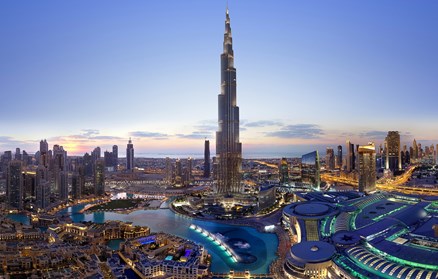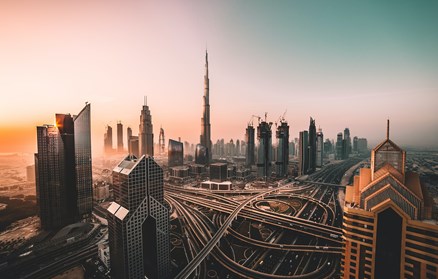INFRASTRUCTURE
Dubai’s strategic location and ease of doing business make it an appealing place for decision-makers to base their companies, but it’s the city’s well-established and dynamic infrastructure that provides the foundation for its economic strength.
This includes ‘hard infrastructure’ such as roads, railways, utilities, logistics facilities, and industrial and manufacturing facilities, as well as ‘soft infrastructure’ in the form of law enforcement and civil services, a robust financial system, education, health care, and cultural and recreational options.
Whether your business needs air, sea or land access from a logistics and trade point of view, a strong regulatory framework to provide a reliable business environment, or a large talent pool and public transport system, Dubai has it all.
UNPARALLELED CONNECTIVITY
Dubai is one of the world’s most connected cities, with trade and logistics at its heart. Whether it’s by air or by sea, Dubai is easily accessible by passengers and cargo alike. Dubai International Airport retained its position as the world's busiest hub for international passengers for the sixth consecutive year in 2019 and, together with Al Maktoum International Airport at Dubai World Central, carried over 88 million passengers and 3.42 Million tonnes of air freight. In total, 140 Airlines fly to 260 destinations direct from Dubai on over 8,000weekly flights. From a shipping perspective, Jebel Ali Port is the biggest and by far the busiest seaport in the Middle-East with 14.1 Million TEU (Twenty-foot Equivalent Units) processed in 2019. No matter what your needs, Dubai can meet them head on.
Logistics Hub
| 88 Million passengers |
|---|
| Through Dubai Airports in 2019 |
| 3.42 Million Tonnes |
|---|
| Air Freight Moved Through Dubai Airports In 2019 |
| 14.1 Million TEU |
|---|
| Through Jebel Ali Port in 2019 |
| #1 |
|---|
| UAE rank in MENA World Bank Logistics Performance Index |
Building on it’s impressive connectivity infrastructure, Dubai has transformed itself from a logistics hub into a supply chain nerve centre in recent years. Continuous large infrastructure investments have strengthened the logistics ecosystem improving global connectivity with multi modal logistics facilities, logistics process digitalisation and warehouse automation.
Dubai’s integrated free zones capitalize on an increase in demand for a sea-air combination for freight movement and the ease of trade facilitation, coupled with technology adoption and availability of qualified resources help to make sure that Dubai is a preferred regional supply chain and distribution gateway. As part of the Dubai 2021 plan, the city intends to become one of the top five logistics centres in the world.
EMBRACING INNOVATION
Dubai believes in the power to accelerate positive change through innovation and continues to build sophisticated and reliable digital infrastructure designed to enable uninterrupted economic growth. Digital infrastructure development has been rapid and all-pervasive, maximizing automation, streamlining processes, and ensuring transparency with future-proofing built into all new projects. The city embraces technologies that push the boundaries of engineering such as the Hyperloop rapid transit system. DP World, the Dubai-based provider of smart logistics solutions, has made a significant investment into the research and development of hyperloop technology and Dubai is set to become its first implementation in the region.
Dubai is strategically committed to cultivating a culture of innovation and the government acts as the driver through specific policies that create economic space for innovators, start-ups and SMEs. An entrepreneur-friendly culture brings together policymakers, enterprises, academia, business, finance and others by rewarding creative thinking and capability development. Dubai has also taken a regional leadership position in the development of a green economy with $27.4 Billion dedicated to the Dubai Green Fund to support and finance clean energy projects and $13.7 Billion to be invested in the 5,000 Megawatt Mohammed bin Rashid Al Maktoum Solar Plant by 2030.
Innovation Mindset
| 1,000+ |
|---|
| Smart government services |
| #8 |
|---|
| UAE globally for households with internet access in the UN ICT Development Rank 2016 |
| #22 |
|---|
| UAE in global average peak connection speed in the Akami State of Internet Connectivity 2017 |
REGULATORY FRAMEWORK AND STABILITY
Dubai’s rapid pace of development is underpinned by a transparent, sophisticated, reliable and adaptable regulatory framework as a platform for growth. Dubai has followed a collaborative policymaking approach to create regulation that is investor friendly, oriented to supporting profitable growth and protecting intellectual property.
Dubai’s public institutions enforce and monitor policy implementation, particularly the aspects that facilitate the investor journey. Policy is matched to business requirements to ensure economic growth in key sectors and to deliver a world-class investor experience.
In an environment of increasing geo-political uncertainty, Dubai continues to be the rock of political, economic and social stability in the region. Such stability promotes business resilience over the long-term and Dubai continuously tries to anticipate, prepare for and proactively mitigate the sources of risk to ensure a high level of confidence for investors.
Regulatory Environment
| #16 |
|---|
| World Bank Ease Of Doing Business Ranking 2020 |
| #2 |
|---|
| Among 28 polled countries with the public expressing 'A High Level Of Trust In The Government' in the Edelman Trust Barometer 2017 |
| #25 |
|---|
| Among 193 economies in the World Bank Control Of Corruption Indicator |
A MAGNET FOR TALENT
Attracting a skilled and effective workforce is one of the main concerns of ambitious businesses large and small, and that’s why Dubai prides itself at ensuring it is a magnet for talent. A collaborative mechanism between government, business and academia enables Dubai’s talent pool to meet private sector requirements. Dubai proactively identifies human capital needs in diverse domains and then attracts and develops high-quality talent at a competitive cost. Intelligence and foresight prepares the city to meet future needs and there is a 40% increase in knowledge workers targeted by 2021. To that end, the Government of Dubai has recently announced the introduction of a 10-Year Golden Visa to all PhD holders, physicians, engineers in the fields of computer engineering, electronics, programming, electricity and biotechnology, as well as holders of specialized degrees in artificial intelligence, big data, or epidemiology and virology in addition to UAE high school top graduates along with their families.
While there is a focus on attracting talent, there is also a focus on developing talent from the ground up too. Dubai is a regional hub for education and is home to 62 Higher Education Institutes with 67,000 enrollments typically each year.
A region-leading public transport system makes it easy for employees to get around town. Almost 600 million passenger trips were recorded on mass or joint transport in Dubai in 2019 with 210 million of those on the Dubai Metro and Tram, while public buses and taxis transported 157 million and 180 million passengers respectively.
Top for Talent
| #1 |
|---|
| UAE rank in MENA in the Insead Global Talent Competitiveness Index 2018 |
| 40% |
|---|
| Targeted increase in knowledge workers by 2021 |
| 67,000+ |
|---|
| Annual enrollments in Higher Education Institutes |







